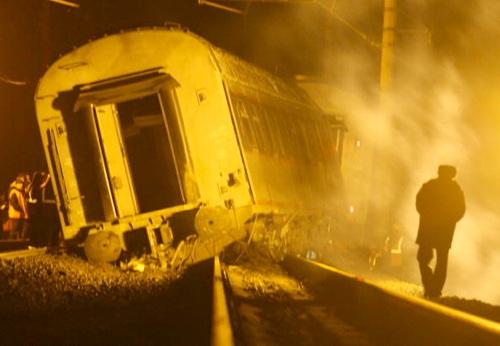
The horrific November 27 bombing of the Nevsky Express halfway between Moscow and St. Petersburg could have serious political repercussions for the Kremlin. News of the explosion, which killed twenty-six and injured around a hundred passengers aboard the luxury, high-speed train, sent shockwaves throughout Russia. Adding to the sense of danger were the deaths of two high-level federal officials in the attack, as well as a second bombing at the site many hours later, which injured Alexander Bastrykhin, the head of the powerful Investigative Committee of the Russian Prosecutor’s Office, and several of his subordinates, who had come to examine the damage. These bombings were followed by yet another explosion, on a railway track in the North Caucasian republic of Dagestan, on November 30. As Yulia Latynina, one of Russia’s top independent journalists put it: “The feeling of war, of a complete and total disintegration of the state, is hanging in the air.”
The Russian Prosecutor’s Office has opened a terrorism investigation and released descriptions of five suspects, reportedly Chechen rebels, who were seen in the location of the Nevsky Express attack before it took place. But even if the police manage to hunt down the perpetrators, they still have a lot to answer for. There was a similar attack on the Nevsky Express in 2007, in which sixty were injured but no one was killed, and many Russians are wondering why the authorities would not have anticipated the threat of further incidents on this prominent train line. When grilled on the radio program Ekho Moskvy about why officials hadn’t been able to obstruct the bomb plot, Alexander Boreshov, vice-president of the Russian railways, had this response: “We have 86,000 kilometers of track in this country … Protecting the entire network is physically impossible.” This of course is true. But there are other ways of preventing terrorist attacks. Why, for example, were the two Russian agencies responsible for counterterrorism, the FSB (successor to the KGB) and the MVD (Interior Ministry), with all their vast resources and intelligence capabilities, caught so off-guard by this attack?
As was the case with earlier terrorist incidents, such as the hostage-taking at the Dubrovka Theater in Moscow in 2002 and the school massacre at Beslan in 2004, the authorities were slow and disorganized in bringing help to the victims. Because no roads have been built in the forested area where the Nevsky Express explosion occurred, it took over an hour for emergency crews to arrive. In the meantime, despite the train’s reputation for premium service, little could be done. One passenger told a St. Petersburg newspaper:
There was no doctor, no first-aid kit on board the train. It seems like there wasn’t anything to provide even the most basic assistance. There weren’t even any flashlights to look for the injured with. A lot of valuable time was lost, time that could have been used to save people. The apparent absence of first-aid kits on such a train was simply unbelievable, especially in light of the 2007 blast. No one even thought to have reserves of bandages.
According to a journalist at the scene, the regional hospital where the victims were treated was in bad disrepair and its facilities were grossly inadequate.
The Nevsky attack—and what happened afterward—reflects particularly poorly on Prime Minister Putin, who used to head the FSB and who has filled both the FSB and the MVD with his close associates. Under his leadership, the FSB and MVD have for several years conducted brutal counterterrorist operations in Chechnya and other parts of the North Caucasus that have further alienated local populations. Their lack of success in bringing stability to this troubled area goes a long way toward explaining why terrorism continues to be such a threat in Russia. Nor does it help that—as President Medvedev pointed out in his November 12 state of the nation address—practically nothing has been done to modernize Russia’s Soviet-era infrastructure, including its road system and hospitals, during the decade Putin has ruled the country.
Putin and his supporters in the security agencies may use the train bombing as an excuse to enact further repressive measures, as they have in the past. In a television appearance on December 3, Putin said, “It is necessary to act in a very tough way against criminals who carry out these kinds of terrorist attacks,” adding that Russia had “enough firmness and decisiveness” to prevent attacks like the Nevsky Express bombing.
Evgenia Albats, editor of The New Times, observed in a recent interview with Ekho Moskvy: “I remember that every time a terrorist act has occurred, it has always been followed by actions aimed at suppressing democratic institutions in the country, destroying the free press and strengthening the agencies of so-called law and order.” According to recent polls, Putin’s popularity, although slipping slightly, remains strong. But whatever his response to this latest act of terrorism, it is unlikely to quell the growing feeling among many Russians that their government is not protecting them.
Advertisement


